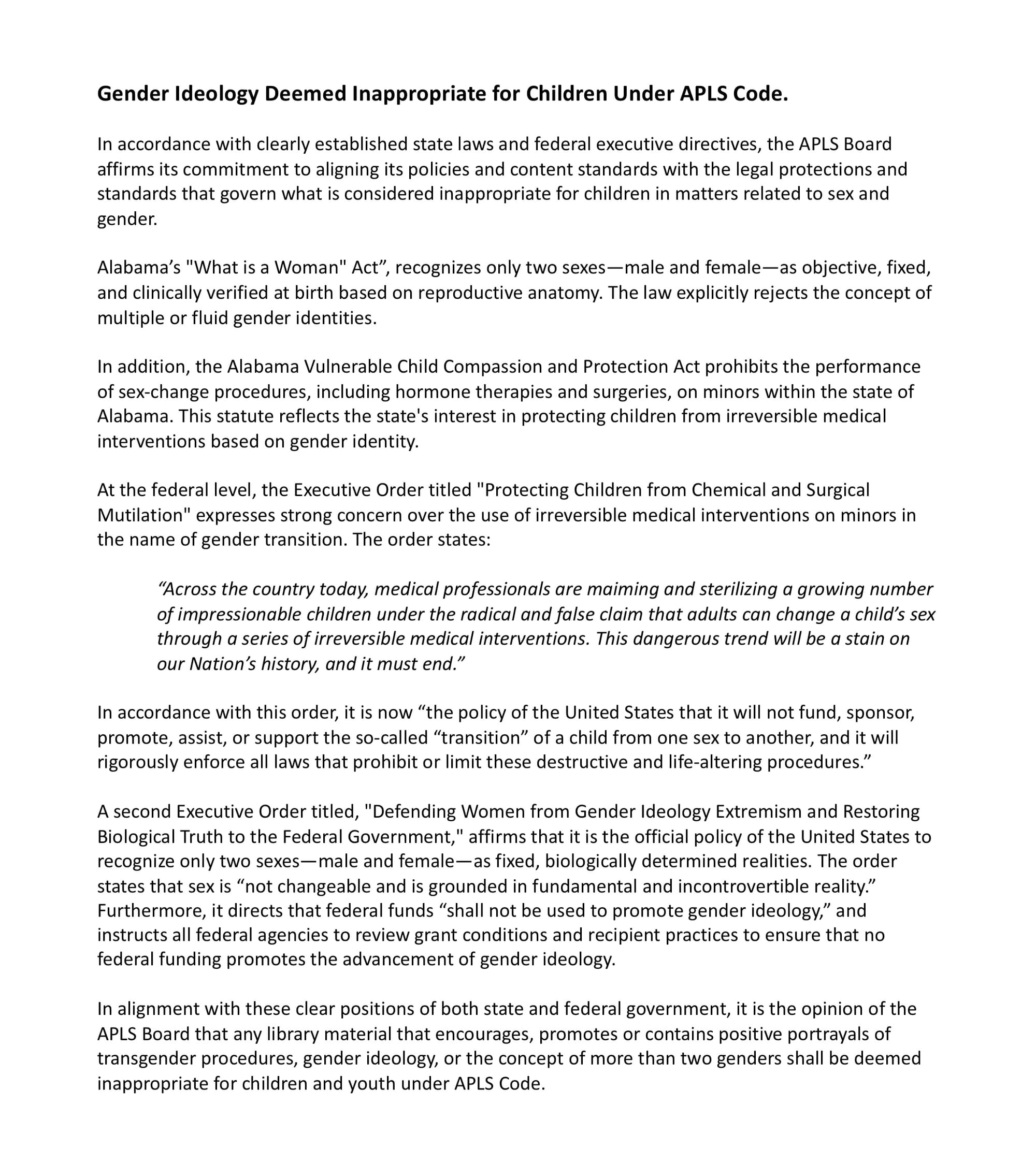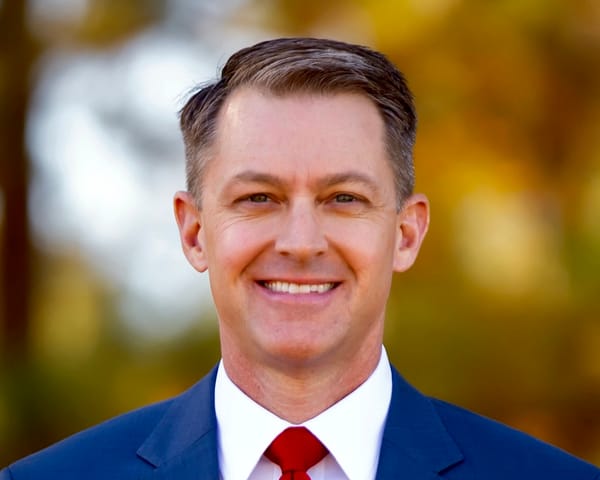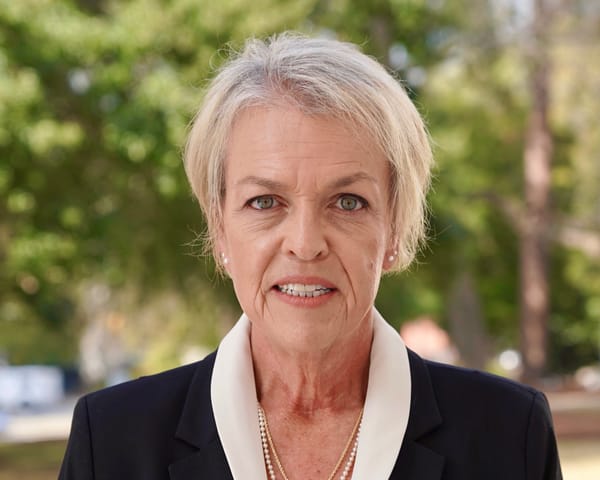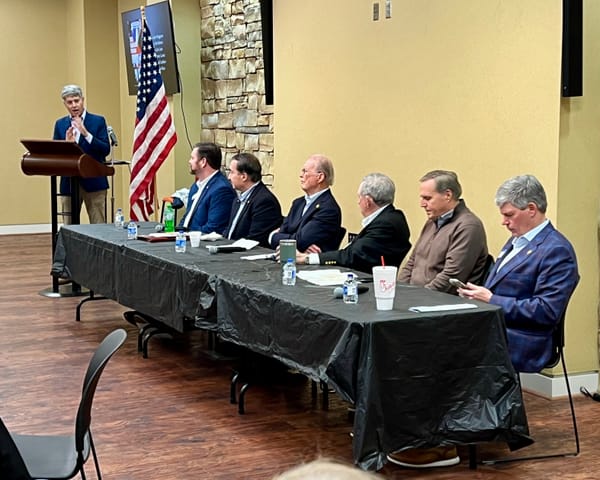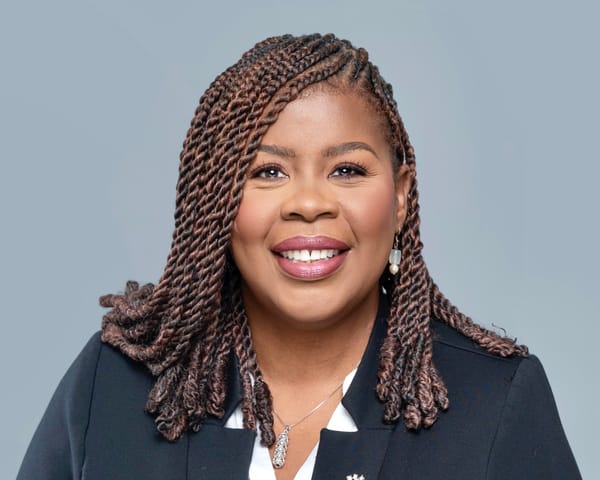Clean Up Alabama / Eagle Forum, Read Freely Alabama Issue Dueling CTAs Before APLS Board Meeting
Each group is rallying members for or against proposed changes to APLS’ Administrative Code

The Alabama Public Library Service (APLS) is once again at the center of a Statewide debate. As the APLS Board prepares to vote on proposed revisions to the State’s library code, three advocacy groups—Clean Up Alabama, with support from Eagle Forum, and Read Freely Alabama—are circulating competing calls to action. Each is rallying supporters to shape the public comment period before the APLS Board’s October meeting.
APLS has proposed amendments to its Administrative Code, specifically Rule 520-2-2-.03, that would tighten restrictions on library materials for minors. The public comment window is open now and closes at 4:30 p.m. CST on October 14, 2025. A public hearing is scheduled for October 21, 2025 at 10:00 a.m. CST at the APLS offices in Montgomery, and requests to speak must also be submitted by October 14.
Written comments must include the sender’s name, valid Alabama mailing address, and date of signature.
Clean Up Alabama, working in conjunction with Eagle Forum, is calling on citizens to demand that libraries stop acquiring and shelve materials they deem inappropriate, especially those involving transgender themes in children’s sections.
In an email sent to ALPolitics.com, the group cited an online search showing “896 books on transgender” in the Jefferson County Public Library catalog as an example of materials purchased using taxpayer dollars. To do this search for yourself, go to THIS LINK and type “transgender” into the Search bar. As of 9/25/2025, this yielded 897 results.
Their demands include:
- Explicitly naming “sexual orientation” in the state code changes.
- Removing materials published for minors (ages 0–17) that “promote gender ideology, transgenderism, or sexual orientation” from libraries entirely, not just relocating them.
- Codifying APLS’s definition of “sexually explicit” into state law to require automatic removal without resorting to the Miller test or wait for challenges.
- Relieving citizens and parents from the burden of initiating challenges, and instead empowering libraries and boards to act proactively.
- Enforcing financial penalties: libraries failing to comply should lose APLS funding until they correct violations.
Clean Up Alabama frames the moment as a moral imperative: “the time for half-measures is over. Alabama families deserve libraries that reflect our values, safeguard our children, and respect parental rights.”
To assist supporters, Clean Up Alabama and Eagle Forum have provided electronic sign-on tools and printable letters.
On the other side stands Read Freely Alabama, which is urging the public to oppose the proposed restrictions, calling them unconstitutional government overreach and censorship.
According to their analysis, the amendments would force libraries to ban or relocate books that portray transgender people positively or exhibit gender diversity, especially for patrons under 18. They also warn of penalties for noncompliance, including loss of State funding.
In a public statement, they quote former APLS Board President Ron Snider, who during past meetings criticized the proposals:
“I’m afraid that Alabama Public Library Service is being used as a platform to boost your own positions to the detriment of the libraries of this state.”
Read Freely contends that banning entire categories of books based on politics undermines both local control and First Amendment rights. They emphasize that in the prior code change process, more than 6,000 public comments were submitted — and the public response made a difference.
They’ve made available a template for public comments (which supporters may customize), and offer help to mail, hand deliver, or submit oral remarks before the Board hearing.
APLS Board Chair John Wahl has publicly defended the proposal. In remarks to media, he said:
"This amendment establishes a clear standard for Alabama libraries and preserves their role as trusted, family-friendly spaces in our communities. Libraries should be places of learning and literacy—not a battleground for social experiments. The goal of this amendment is to address the growing concerns of parents and community members about the accessibility of sexual topics in library sections dedicated to minors. We have a duty to protect children from sexualization and radical ideologies that seek to confuse them about who they are. Alabama families deserve to know they can trust our library youth sections to be safe and age-appropriate.”
The proposal responds to parent concerns about materials featuring transgender themes for minors. The draft language would allow the code to define “material that promotes, encourages, or positively depicts transgender procedures, gender ideology, or the concept of more than two biological genders” as inappropriate for children and youth.
Notably, former Board President Snider cast the lone dissenting vote on advancing the change and accused Board members of leveraging the Board platform for political gain.
While APLS has enforcement authority over State aid and issues guidance, the Agency does not directly govern the day-to-day operations of county or municipal libraries.
If you would like to engage the APLS Board on this issue, you can:
- Submit a written comment by October 14, 2025 (signed, with a valid Alabama mailing address).
- If you wish to speak at the hearing (October 21), send a request by October 14 to vcarr@apls.state.al.us. Oral remarks will be limited to 2 minutes and ordered by request time.
- Use templated letters or write your own. Both sides offer resources and links for supporters to act.
- Share the appeals, including this article, with friends, family, church or civic groups.
To read and print the Clean Up Alabama letter or use their electronic submission form to send the letter to APLS, follow THIS LINK.
To read and print the Eagle Forum letter (which is identical to the Clean Up Alabama letter) or use their electronic submission form to send the letter to APLS, follow THIS LINK.
To send a message supporting Read Freely Alabama’s position, follow THIS LINK. When you submit the form, Read Freely Alabama will print out and submit your written comments on your behalf.
To speak at the hearing on October 21, send a request by October 14 to vcarr@apls.state.al.us.
All forms, letters and requests to speak must be received by the Alabama Public Library Service in Montgomery no later than 4:30 p.m. CST on October 14, 2025.
The APLS Board will consider every comment submitted. Whether libraries maintain broader access to diverse voices or tighten restrictions on content for minors will largely depend on which message resonates more with citizens and Board members.
"We want to hear from the public," Chairman Wahl said. "This is an open process, and every citizen has the right to weigh in. Whether people support the amendment or have concerns, we value that feedback.
The proposed change to the APLS Administrative Code is below:
